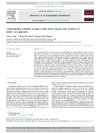Identificador persistente para citar o vincular este elemento:
https://accedacris.ulpgc.es/jspui/handle/10553/77508
| Campo DC | Valor | idioma |
|---|---|---|
| dc.contributor.author | Vega, Amaya | en_US |
| dc.contributor.author | Feo Valero, Maria | en_US |
| dc.contributor.author | Espino Espino, Raquel | en_US |
| dc.date.accessioned | 2021-02-04T09:02:13Z | - |
| dc.date.available | 2021-02-04T09:02:13Z | - |
| dc.date.issued | 2021 | en_US |
| dc.identifier.issn | 0739-8859 | en_US |
| dc.identifier.other | Scopus | - |
| dc.identifier.uri | https://accedacris.ulpgc.es/handle/10553/77508 | - |
| dc.description.abstract | The reduction in the level of maritime connectivity between Ireland and mainland Europe has been the focus of concern for Irish exporters since the withdrawal of the United Kingdom from the European Union in January 2019. In a post-Brexit scenario, new proposals are being sought to address Ireland's reliance on the UK land-bridge. Policy developments aimed at circumventing the potential negative impact of UK customs checks for Irish exports include the proposals by the European Commission to introduce new direct shipping routes connecting main ports in Ireland with Zeebrugge and Antwerp in Belgium, as well as with Rotterdam in the Netherlands. From a transport policy perspective, finding alternatives to Ireland's reliance on the land bridge over Britain is a strategic priority. A better understanding of shippers' route preferences from Ireland to continental Europe is an important aspect in the formulation and assessment of future policies on freight transport. The objective of this paper is precisely to contribute to this by providing an analysis of route choice behaviour from the perspective of the shipper. The paper presents an analysis of non-observable heterogeneity from the estimation of a Latent Class Model (LCM). Using data from an efficient stated preference (SP) experiment undertaken to model route choice between Ireland and continental Europe, results from this paper provide an understanding of the effects that the main transport attributes such as cost and transit time have within identified Irish shipper segments. The paper contributes to transport policy by offering a strategically relevant insight into the demand side for maritime transport services in Ireland. | en_US |
| dc.language | eng | en_US |
| dc.relation.ispartof | Research in Transportation Economics | en_US |
| dc.source | Research in Transportation Economics [ISSN 0739-8859], v. 90, 101025 | en_US |
| dc.subject | 531212 Transportes y comunicaciones | en_US |
| dc.subject.other | Latent Class Model | en_US |
| dc.subject.other | Maritime Transport Route Choice | en_US |
| dc.subject.other | Stated Preference Methods | en_US |
| dc.title | Understanding maritime transport route choice among Irish exporters: a latent class approach | en_US |
| dc.type | info:eu-repo/semantics/Article | en_US |
| dc.type | article | en_US |
| dc.identifier.doi | 10.1016/j.retrec.2020.101025 | en_US |
| dc.identifier.scopus | 85099280975 | - |
| dc.contributor.authorscopusid | 24478202200 | - |
| dc.contributor.authorscopusid | 26323132100 | - |
| dc.contributor.authorscopusid | 57221498701 | - |
| dc.investigacion | Ciencias Sociales y Jurídicas | en_US |
| dc.type2 | Artículo | en_US |
| dc.utils.revision | Sí | en_US |
| dc.identifier.ulpgc | Sí | en_US |
| dc.identifier.ulpgc | Sí | en_US |
| dc.identifier.ulpgc | Sí | en_US |
| dc.identifier.ulpgc | Sí | en_US |
| dc.contributor.buulpgc | BU-ECO | en_US |
| dc.description.sjr | 0,759 | |
| dc.description.jcr | 2,904 | |
| dc.description.sjrq | Q1 | |
| dc.description.jcrq | Q2 | |
| dc.description.ssci | SSCI | |
| dc.description.miaricds | 9,0 | |
| item.grantfulltext | open | - |
| item.fulltext | Con texto completo | - |
| crisitem.author.dept | GIR TIDES: Investigación en Turismo y Transporte | - |
| crisitem.author.dept | IU de Turismo y Desarrollo Económico Sostenible | - |
| crisitem.author.dept | Departamento de Análisis Económico Aplicado | - |
| crisitem.author.orcid | 0000-0002-4138-5846 | - |
| crisitem.author.parentorg | IU de Turismo y Desarrollo Económico Sostenible | - |
| crisitem.author.fullName | Espino Espino, Raquel | - |
| Colección: | Artículos | |
Citas SCOPUSTM
7
actualizado el 08-jun-2025
Citas de WEB OF SCIENCETM
Citations
6
actualizado el 22-feb-2026
Visitas
402
actualizado el 09-ene-2026
Descargas
300
actualizado el 09-ene-2026
Google ScholarTM
Verifica
Altmetric
Comparte
Exporta metadatos
Los elementos en ULPGC accedaCRIS están protegidos por derechos de autor con todos los derechos reservados, a menos que se indique lo contrario.
